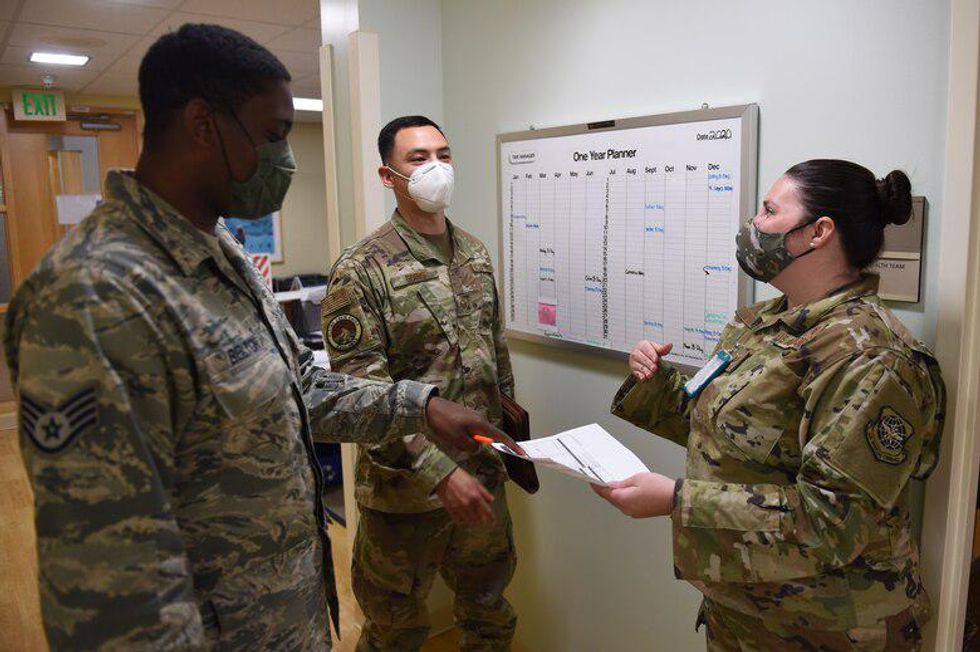Using Risk Management To Combat The Psychological Impact Of The COVID-19 Pandemic

The complete impact of the COVID-19 crisis on our collective and individual psyches is still not fully understood. Our society was completely transformed from a reasonably predictable one with specific structures, policies, and plans to handle the crises at the time, to an incredibly uncertain one, challenging even the most optimistic people.
With uncertainty comes heightened stress, emotional strains, and, yes, despair. There are project management techniques such as risk management which can be quite useful in helping us navigate through the VUCA (vulnerable, uncertain, chaotic, ambiguity) and now BANI (brittle, anxious, non-linear and incomprehensible) world.
Uncovering Mental Health Issues

As I write this article, the world is still in the throes of the COVID-19 crisis which has led to a significant number of documented cases of anxiety and depression. These cases no doubt stem from the unprecedented changes in our lifestyle globally, but also accentuate mental health issues that may have already existed in many people, yet were only manifested during the crisis.
I would like to address those cases which had a direct impact on people's livelihood such as the record number of people who suffered job losses, financial losses from investments, or some other work-related cause which triggered these highly negative emotional responses. I know what this feels like as I have encountered a number of these economic hardships myself, most recently when I had to reassess many things in my life after losing my job on my 50th birthday.
Although I do not profess to have all of the answers nor am I a psychologist, I can share what I used as a coping mechanism to get me through the hard times: the principle of risk management, another one of the 10 knowledge areas of the project management profession.
We see risk management in every profession and in many walks of life so the concept in and of itself is nothing new. The application of the concept though is what I feel can help raise levels of awareness of possible risks and their consequences while lowering anxiety, stress, and fear of the unknown.What Is Risk Management?
 File:US DontWalk Traffic Signal.JPG - Wikimedia Commonscommons.wikimedia.org
File:US DontWalk Traffic Signal.JPG - Wikimedia Commonscommons.wikimedia.orgRisks are, of course, events that could possibly occur and impact (negatively or positively) one's life, work, or leisure. Applied to the project management profession, risk management can be an equally sophisticated technique or quite straight forward, depending on the person's or organization's needs.
In its simplest form, the simple technique of the heat map, or stoplight technique, is applied to categorize potential risks that can occur as high, medium, or low-risk events. There is no need to perform an extremely detailed analysis of each risk, nor perform calculations in order to categorize the probability of such an occurrence. I particularly like this technique as it is extremely visual in nature so the eye is immediately drawn to the green, yellow, and red colors to perform a quick assessment of the host of risks identified. For me, this is very useful when I apply the technique in non-professional settings, such as my hobbies and everyday life.
In its most complex form, advanced risk management techniques such as Monte Carlo simulations can provide bell-curve shaped probability matrices to express and then rank risks by their probability of occurrence, financial impact, and what-if, statistical-based scenarios on a project. These simulations require specific software as well as a highly trained person to perform. This technique is typically beneficial for large, complex projects with significant investment as well as high levels of exposure.
Whatever the technique(s) used, applying risk management to my life has greatly helped me manage my stress level as I have trained myself to apply a risk filter to virtually everything I do. I find that by identifying various situations that I find myself in, such as the risks associated with driving to the grocery store, to a sporting event, or to someone's house while living in a large, dangerous city such as Rio de Janeiro, help me frame each activity so that I hopefully minimize surprises that could occur along the way.
Creating Your Mitigation Plan
 62nd MDS public health Airmen help move the mission forward > Team ...www.mcchord.af.mil
62nd MDS public health Airmen help move the mission forward > Team ...www.mcchord.af.milWhen we talk about risk, we also talk about the mitigation plan for which we make a plan to reduce or eliminate the impact of a risk. This could include additional spend, implementing work-arounds, taking an alternate route, leaving earlier, or going to the grocery store on a particular day or time, just to name a few. By planning for such possible events, we typically reduce our level of anxiety and, as a result, our overall stress levels.
In the business world, risk management is obviously applied in every industry and also at virtually every level. For those companies who have actual risk managers, there are great benefits to be had as it is applied across functional areas. In cases where there is no such position, the project manager usually assumes this function as part of his or her responsibility. Whatever the case may be, this is a mission-critical function for long-term success of any company.
The danger, of course, is to over apply this concept so as to avoid becoming paranoid or obsessed with trying to mitigate every single possible risk that could occur in my life. I have learned to identify and focus on my top 10-20 risks, just as my employers have requested I present on the projects I have led. It is definitely important not to lose sight of the other risks on the risk register, but, in the interest of time, the major risks are the ones to apply the most resources.Applying The Right Dose Of Risk Management To Our Lives
 Woman Illustrating Albert Einstein Formula | Pikrepo
Woman Illustrating Albert Einstein Formula | PikrepoAs a parent, we oftentimes have the tendency to overthink the process in an effort to protect our children as much as possible. But, as they say, our kids need to learn certain life lessons on their own, so we can really only do our best to steer them in an appropriate direction while managing again the top, high-level risks in the process.
During the COVID-19 quarantine situation, this situation was aggravated in many households with some very unfortunate outcomes for those families who had to implement ad hoc techniques to cope with home schooling, home office scenarios, as well as limited access to grocery stores, pharmacies, and the like. Many of the parents were taken off guard and had to quickly adapt to the "new normal" while hoping that this would not impact their livelihood or quality of life.
The almost immediate transfer of our lives to the digital arena obviously had a major impact as well, with many still unable to cope with the new challenges and expectations even today.
In this unprecedented scenario, my advice would then be to use but dose the application of risk management as part of your work-life balance. I would suggest creating a personal risk register to identify all of the areas of your life that have already been impacted by COVID-19 as well as the mitigation plans you have had to implement as a result.
I would then recommend thinking deeper on how this prolonged situation as well as the permanent changes to our society can impact your life going forward. Again, by putting this on paper (or Excel!), you can greatly alleviate your anxiety, sleep patterns, and quality of life in the process.
- 3 Things To Consider Before Taking A Career Risk - Work It Daily ›
- How Project Management Solved A Crisis Early On In My Career ... ›
- 3 Things Employers Should Focus On After COVID-19 - Work It Daily ›
- 5 Ways A “Boutique BPO” Insulates Leaders Amidst Uncertainty - Work It Daily ›

 Bigstock
Bigstock Bigstock
Bigstock Bigstock
Bigstock


